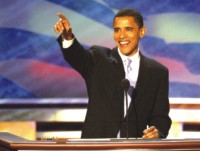|
International
The Audacity of Hope
Obama
Phenomenon
Azizul Jalil
“Do we participate in a politics of cynicism or a politics of hope?”
“There is not a Black America and White America and a Latino and Asian America- there's the United States of America.”
Senator Barack Obama
 |
Barack Obama |
The US presidential election later this year is particularly interesting due to domestic issues and international war and peace issues. If you superimpose on it the colourful and novel personalities involved in the primary races, it becomes very exciting and full of historical possibilities. And the words change and hope are in every candidate's mouth and one has even named his campaign bus as 'Change Express.' But Obama is the one who initiated this call and nobody personifies these words more than him. Change indeed is in the air. It is for the first time in US history that there is a good possibility of a woman, Hillary Clinton, being elected as president. She may follow- Latin American style, the footsteps of her husband, who had been a president for eight years in the nineteen-nineties. As if that were not enough, for the very first time a black candidate, Barack Obama, has risen-young and fresh with ideas of hope and change, which he expresses with lofty and noble rhetoric. About his chances for success there is a feeling in Kenya, after the recent flawed presidential election where a candidate from the Luo tribe allegedly was denied victory by fraud, that a Luo (Obama's father was a Kenyan Luo) would be elected the president of USA before a Luo becomes Kenya's president.
If a black becomes president it would be a unique and historic event because of US's record of slavery until the mid-nineteenth century and racial segregation as late as the sixties in the twentieth century. The black population is only about 12.8 percent of the US population, and Obama is not a native black but son of a recent black immigrant and a white American mother. Thus, an Obama victory would mean that a majority of white and other American voters e.g. Hispanic, Asian supported him.
During every election, one is tempted to conduct his or her own poll, however unscientific or incomplete it might be. I am no exception. I asked a white American woman whose parents are strong Republicans who she would vote for. She has a PhD- was educated at the finest colleges and universities. Her straight answer was Obama. We also asked a neighbour-a Chinese American woman doctor who had a Harvard and Columbia education. She was unequivocally for Obama. Amongst the usually cautious Bangladeshi community, though there is general sympathy for Obama, there is lack of confidence and a lingering
doubt whether a black at this time could be elected president.
Barack Obama came to the limelight when he delivered a ringing keynote speech at the 2004 Democratic Convention. He was at that time only a young state senator in Illinois. Obama, who had a multicultural childhood, grew up in Hawaii and Indonesia. In reviewing Obama's book “the Audacity of Hope”, The New York Times had this to say about him: “growing up in the 1960's and 70's, straddling America's colour lines: the sum of two worlds and belonging to neither, the sense of having to forge an identity of his own.”
Obama went to Harvard Law School and later became the editor of Harvard Law Review- a prestigious position indeed. He did not go to a large law firm in New York or Washington to earn a fat salary-he chose instead to become a Community organiser in Chicago. He later became a professor of constitutional law, a civil rights lawyer, state senator, two years ago-a US Senator and internalised all these roles. The main reason why people of all colours, levels of income, and education seem to be attracted to his message is that he appears to be sincere. Young college students are particularly enthused.
So far, Obama won the caucus (primary) in Iowa, and became a close second in New Hampshire. The Democratic primaries in the next two weeks are in Michigan, Nevada- where he has received good endorsements and is likely to win, and South Carolina. In the last one, there is a significant black population and Obama is likely to do very well, despite the presence of Edwards, a candidate who belongs to that state. It is too early to predict how it will all go in the rest of the primary elections and whether at the end Obama will be able to win the Democratic nomination. If he does, he might win the presidency. Obama seems to be a pragmatist and a politician of the 'third way', without ideological hang-ups. He might be able to unite the divided nation across the class, race and political divide.
The tide is in favour of the Democrats because of President Bush's lapses, particularly in the Iraq war, the looming economic recession and the bad image of USA for its aggressive and arrogant postures in international and environmental affairs. An Obama victory would also mean that America is atoning for its past racial injustices. It would demonstrate to the world how great and liberal the American people are and how strong are the foundations of its democracy. 'Life, liberty and the pursuit of happiness' as enshrined in the US declaration of independence would then truly become the 'inalienable rights' of all Americans, irrespective of race, colour or creed. Let us audaciously hope for a real change.
Azizul Jalil writes from Washington.
Copyright
(R) thedailystar.net 2008
|
